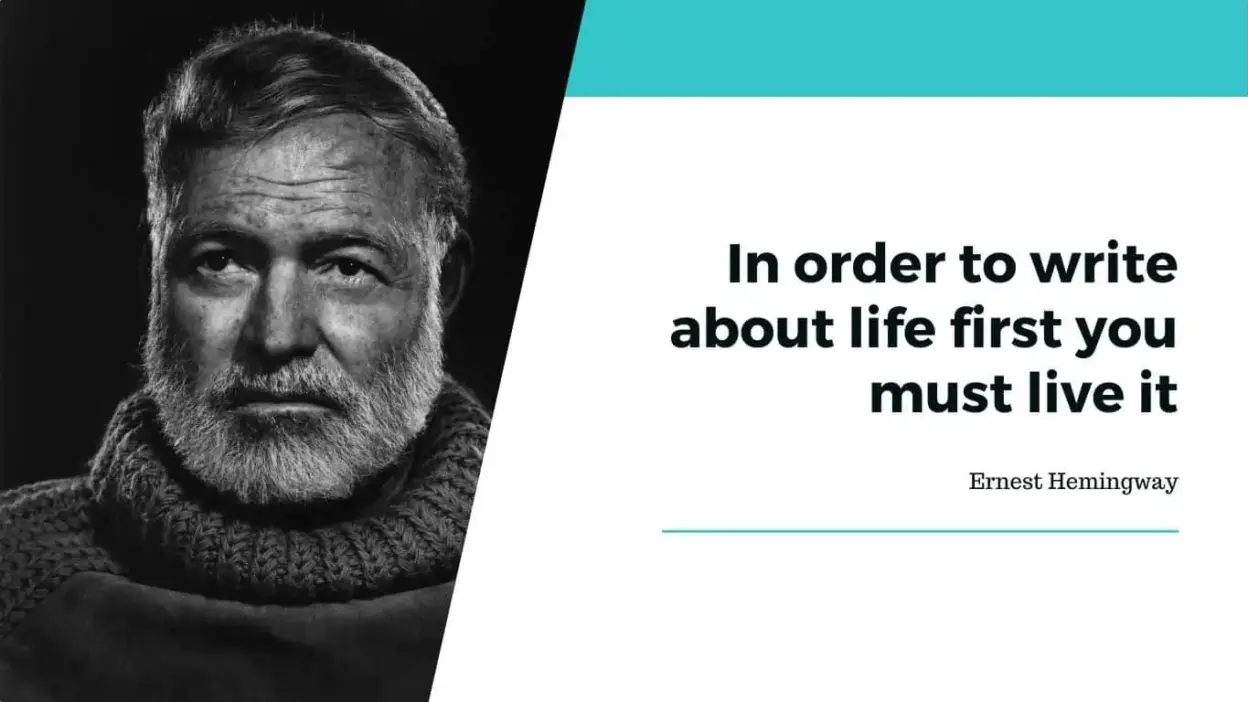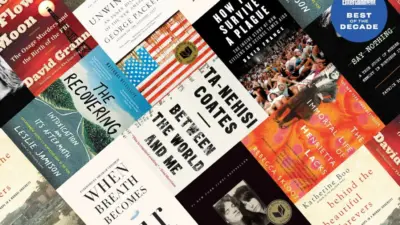- Hemingway once famously said, “In order to write about life first you must live it”.
- Their works underscore Hemingway’s wisdom, reminding us that living fully is the first step to writing deeply and …
- Living Fuels Writing: As discussed in previous sections, life experiences provide raw material for our narratives.
- The Feedback Loop of Living and Writing: There is a constant feedback loop between living and writing.
- Our experiences fuel our writing, while the insights we gain from writing inform how we approach our lives.
- Ernest Hemingway’s wisdom, “In order to write about life first you must live it,” underlines this intr…
In an era saturated with information, where stories and narratives constantly swirl around us, the craft of writing continues to hold a unique, transformative power. The ability to weave words into narratives that can inspire, influence, and enlighten others is an art as old as time itself. One individual who mastered this art with unbridled expertise was the legendary American novelist and short-story writer, Ernest Hemingway. Hemingway once famously said, “In order to write about life first you must live it”. By this quote he reminds us that the essence of writing doesn’t reside solely in the mastery of language, or the clever use of literary devices, but in the richness of the life experiences that fuel our stories.
Importance of Living Before Writing
Ernest Hemingway’s assertion that one must first live life in order to write about it succinctly emphasizes the irreplaceable role of personal experience in crafting resonant narratives. While it’s possible to write about abstract concepts or pen imaginative Stories solely from one’s mind, writing that draws from the well of lived experience often resonates more deeply with readers. This is primarily due to three key reasons:
- Authenticity: A life lived provides a wealth of authentic material to draw from. This authenticity is difficult to replicate through imagination alone. When an author writes from personal experience, the narrative is imbued with genuine emotions, thoughts, and reactions that make the story more relatable and credible to readers.
- Depth of Understanding: Experiencing something first-hand offers a unique perspective and deep understanding that reading or hearing about it simply cannot provide. This depth of understanding enables writers to portray events, characters, and emotions with nuance and accuracy, fostering a more immersive experience for the reader.
- Uniqueness of Perspective: Every individual’s life experience is unique, and therefore, each person has a unique story to tell. Drawing from one’s own life experiences allows writers to present a unique viewpoint, a personal flavor that sets their work apart from others.
Living Fully: Definition and Examples
What does it mean to “live fully”? The concept is subjective and can vary greatly from person to person. For some, living fully might mean traveling the world and experiencing different cultures. For others, it could involve diving deep into the realms of intellectual pursuits, exploring the intricate wonders of science or literature. Yet, for others, it might mean connecting deeply with people, forming meaningful relationships, and making a difference in others’ lives. Regardless of the personal definitions, living fully involves embracing life with curiosity, openness, and passion, actively engaging with the world around us rather than simply existing.
Let’s look at a few examples of individuals who’ve lived fully, in different ways, and how this has informed their writing:
1. Jack Kerouac: Known as a pioneer of the Beat Generation, Kerouac’s writing was profoundly influenced by his experiences. His seminal work, “On the Road,” was a semi-autobiographical novel that chronicled his cross-country adventures with his friends. Through his personal experiences, he captured the spirit of a generation that yearned for freedom, authenticity, and spontaneous joy.
2. Maya Angelou: Angelou was an American poet and civil rights activist who drew heavily from her life experiences in her works. From her childhood trauma to her active role in the Civil Rights Movement, Angelou’s experiences deeply influenced her poetry and prose. Her autobiographical work, “I Know Why the Caged Bird Sings,” showcases her strength and resilience, providing a powerful testament to the human capacity to overcome adversity.
3. Anthony Bourdain: Known for his love of food and travel, Bourdain explored cultures around the world through their cuisines. His experiences as a chef, traveler, and keen observer of humanity informed his writing, resulting in best-selling books like “Kitchen Confidential” and “A Cook’s Tour.” Bourdain’s unique blend of culinary knowledge, cultural insights, and personal reflections made his works compelling reads.
Each of these writers embraced life in their unique ways, and their experiences breathed life into their words, showcasing the beauty, pain, and complexity of the human condition. Their works underscore Hemingway’s wisdom, reminding us that living fully is the first step to writing deeply and authentically.
The Relationship between Living and Writing
The relationship between living and writing is far more profound than it initially appears. They are not merely two distinct activities but rather, they are deeply interconnected aspects of the human experience, each enriching and amplifying the other.
1. Living Fuels Writing: As discussed in previous sections, life experiences provide raw material for our narratives. Our observations, encounters, joys, sorrows, triumphs, and failures all serve as invaluable sources of inspiration for our writing. Living life with openness and curiosity transforms us into keen observers and empathetic interpreters of the human condition, which in turn enhances our ability to write authentically and compellingly.
2. Writing Enhances Living: While it’s clear that living influences our writing, it’s equally important to acknowledge that the act of writing can enhance our understanding and appreciation of life. Writing forces us to reflect on our experiences, to delve deeper into our thoughts and feelings. This introspective process can lead to profound self-discoveries, personal growth, and a greater understanding of the world around us. Furthermore, writing allows us to immortalize our experiences, capturing fleeting moments and emotions in words, thereby allowing us to revisit, reevaluate, and learn from them.
3. The Feedback Loop of Living and Writing: There is a constant feedback loop between living and writing. Our experiences fuel our writing, while the insights we gain from writing inform how we approach our lives. This symbiotic relationship enables us to grow both as writers and as individuals. Each new experience gives us fresh perspectives to write about, and the act of translating these experiences into words further deepens our understanding of them.
Conclusion
As we journey through the rich tapestry of life, we find ourselves in the dual role of actors and spectators. We engage with the world, we experience, we learn, and we grow. And when we take up the pen to write, we transform from spectators into chroniclers of the human experience. Through our words, we capture the essence of life as we perceive it, providing our readers with glimpses into our world, our perspectives, and our souls.
Ernest Hemingway’s wisdom, “In order to write about life first you must live it,” underlines this intricate dance between living and writing. This exploration has taken us through the vital connection between the two, demonstrating that authentic writing springs from the well of lived experiences, while the process of writing further enriches our understanding of life.
Also Read: I failed my way to success – Thomas Edison



